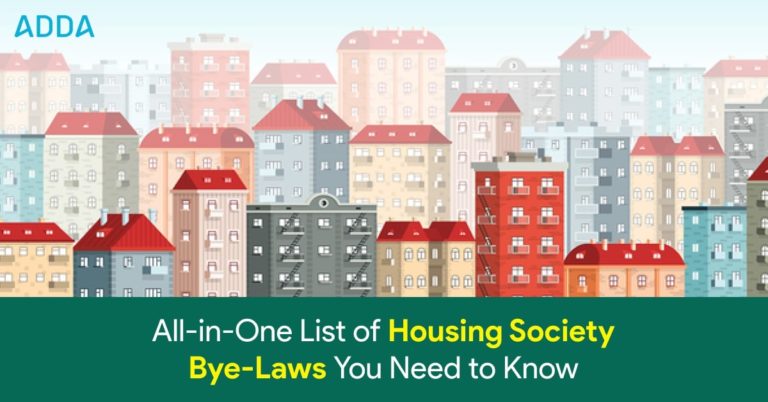Co-operative housing societies are a popular form of community living in many parts of the world. They provide a way for individuals to pool their resources and purchase a property collectively. However, like any other community, there are certain rules and regulations that need to be followed.
A cooperative society, or simply a co-op, is a type of organization owned and operated by a group of individuals who share a common interest or goal. Members of a co-op typically pool their resources, whether that be financial, labor, or otherwise, in order to achieve a common purpose that benefits all members.
Cooperative societies can take many different forms, including agricultural co-ops, housing co-ops, consumer co-ops, and worker co-ops, among others. In general, all co-ops share a commitment to democratic decision-making, with each member having an equal say in how the organization is run.
Cooperative societies are often created in response to a specific need or problem within a community, and can offer a number of benefits to their members, such as access to goods or services that might be difficult to obtain otherwise, or the ability to pool resources to achieve economies of scale.
Overall, co-op societies represent a unique form of collective action, allowing individuals to come together to achieve shared goals in a way that benefits everyone involved. In this guide, we will discuss the model bye-laws of co-operative housing societies and explain their importance.
Also read about housing society rules and regulation
What are Model Bye-laws?
Model bye-laws are a set of rules and regulations that are formulated by the government for co-operative housing societies. They provide a framework for the functioning of the society and cover a wide range of topics, including membership, elections, management, finances, and dispute resolution. Every co-operative housing society is required to follow these bye-laws, and any deviation can result in penalties or legal action.
Membership
The first and foremost requirement for becoming a member of a co-operative housing society is to be eligible as per the provisions of the co-operative societies act. The applicant must also comply with the society’s bye-laws, which specify the qualifications for membership, the procedure for admission, and the obligations of members.
Elections
Elections are an integral part of the functioning of a co-operative housing society. The bye-laws lay down the rules and procedures for conducting elections, including the eligibility criteria for candidates, the process for nomination and withdrawal, the voting process, and the counting of votes. The bye-laws also provide for the appointment of an election officer to oversee the entire process.
Management
The bye-laws provide for the establishment of a managing committee to manage the affairs of the society. The committee is responsible for the day-to-day administration of the society, including the collection of dues, maintenance of records, and the maintenance and repair of the society’s property. The bye-laws also specify the duties and responsibilities of the committee members and the procedure for their appointment and removal.
Finances
The bye-laws also cover the financial aspects of the society, including the collection of fees and dues, the preparation of budgets, the maintenance of accounts, and the audit of the society’s finances. The bye-laws also provide for the establishment of a sinking fund to meet the society’s long-term financial requirements.
Dispute Resolution
Disputes are a common occurrence in any community, and co-operative housing societies are no exception. The bye-laws provide for a dispute resolution mechanism to resolve disputes between members, between members and the society, and between the society and third parties. The mechanism may include the appointment of a mediator or an arbitrator or may involve approaching the appropriate legal authority.
The Importance of Following Model Bye-laws
Following the model bye-laws of co-operative housing societies is crucial for several reasons. Firstly, they provide a clear set of rules and regulations for the functioning of the society. This clarity helps to avoid misunderstandings and conflicts between members and the managing committee.
Secondly, following the bye-laws helps to maintain the integrity of the society. Co-operative housing societies operate on the principle of collective ownership and management. The bye-laws help to ensure that every member’s rights and interests are protected and that the society operates in a fair and transparent manner.
Thirdly, adherence to the bye-laws is necessary to maintain the legal status of the society. Co-operative housing societies are registered entities and must comply with the provisions of the co-operative societies act. Failure to follow the bye-laws can result in legal action and penalties.
Tips for Effective Implementation of Model Bye-laws
Implementing the model bye-laws effectively requires the cooperation and commitment of every member of the society. Here are some tips for effective implementation:
- Educate members about the bye-laws and their importance.
- Ensure that the managing committee is composed of qualified and competent individuals who are committed to the society’s objectives.
- Develop a system for regular communication between the managing committee and the members.
- Ensure that the society’s finances are managed transparently and with integrity.
- Encourage members to participate in the society’s activities and decision-making processes.
Conclusion
In conclusion, the model bye-laws of co-operative housing societies provide a comprehensive framework for the functioning of such societies. They cover a wide range of topics and provide guidelines for the management, administration, and resolution of disputes. It is essential for every co-operative housing society to follow these bye-laws to ensure smooth and effective functioning. We hope that this guide has helped you understand the importance of model bye-laws and how they can benefit your co-operative housing society.





